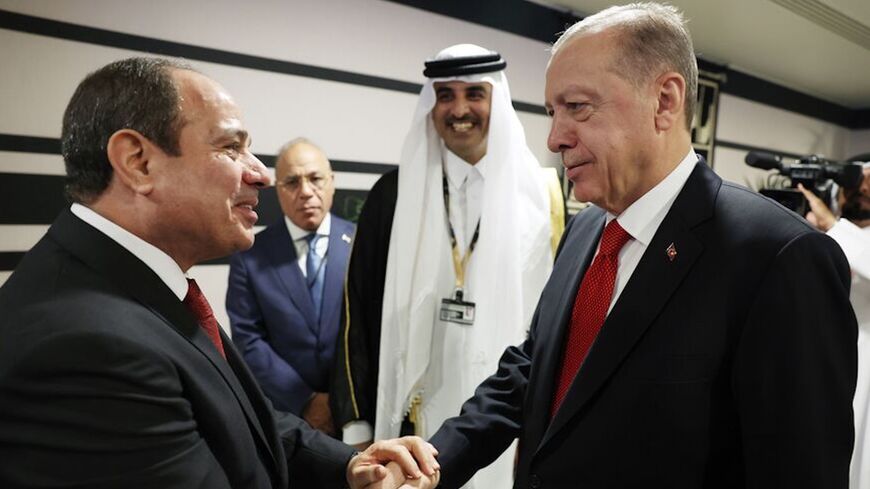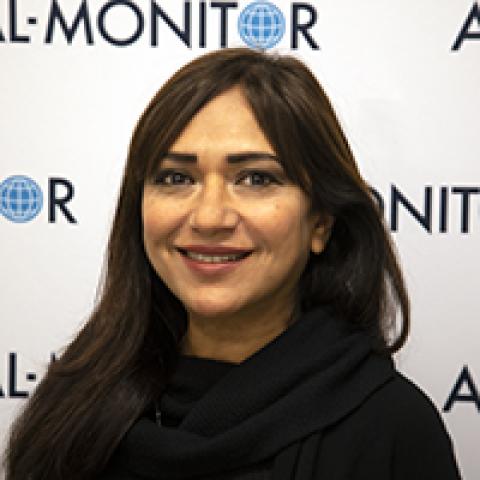A decade ago, Turkey’s President Recep Tayyip Erdogan called Egypt’s strongman “a brutal killer” and vowed never to shake hands with him for overthrowing and jailing Mohammed Morsi just a year after the Muslim Brotherhood leader, who died in custody, became the country’s first democratically elected president in 2012.
This week, Erdogan was allegedly preparing to host President Abdel Fattah al-Sisi, who has, in turn, accused him of “supporting terrorists,” among other misdeeds. According to unconfirmed reports in Turkish media, Sisi might even arrive in the Turkish capital as soon as Thursday, days after the countries exchanged ambassadors for the first time since Morsi’s ouster.
The U-turn is the latest in a series of similar moves that have seen Erdogan reach out to former foes including Saudi Arabia’s Crown Prince Mohammed bin Salman, the United Arab Emirates’ President Mohammed bin Zayed Al Nahyan and his ultimate nemesis, Syria's Bashar al-Assad.
Turkey’s weakening economy and diplomatic isolation are commonly cited as the main drivers for the change. But how to explain the ease with which he has altered course, facing little if any popular pushback?
After all, Erdogan's fiery support for the Palestinians and Islamist oppositionists seeking to overthrow their respective dictators decimated Ankara’s ties with those regimes, but it made him a hero among millions of pious Muslims across the globe. At home, it gave the Turkish leader a moral platform that allowed his base to tune out allegations of massive corruption and reimagine modern Turkey as the protector of the Muslim masses, as it was under their Ottoman forebears. But none of his crusades resonated quite as much as that against Sisi, whose bloody takeover presaged the collapse of the Arab Spring.
Posing such questions is plainly naive, according to those familiar with Turkey’s Islamist movement. Osman Sert, research director at PANORAMATR, an Ankara-based think tank, recalls that Erdogan’s pirouettes are not limited to foreign policy. For example, despite his visceral opposition to interest rates — he would rather they be abolished in keeping with Muslim prescriptions — Erdogan has allowed his new team tasked with repairing the economy to raise them. “Analysts seek answers within the realm of reason when they lie in Erdogan’s unique relationship with his people. It is one of trust in which they give him a blank check,” Sert said. The failure to grasp the nature of this dynamic is what led so many to believe that Erdogan would lose parliamentary and presidential elections in May. He and his ruling Justice and Development Party (AKP) won both.
“The people do not assess these pivots on a case-by-case basis. They have faith in Erdogan as offspring would in a pater familias,” Sert explained.
Osman Atalay, a veteran of Turkey’s Humanitarian Relief Foundation (IHH), an Islamic charity that is active across the world, concurred. “Erdogan’s followers see that he and the AKP are in deep trouble. That the economy is in dire straits. That Turkey is under intense pressure from America and Europe. That he, therefore, has no other choice than to change tack, however painful it may be,” Atalay observed. This partisan mindset tolerates such maneuvers as ensuring survival and does not blame the leader for getting them into the sort of mess that necessitates them. Erdogan’s recent fundraising tour of Saudi Arabia, Qatar and the United Arab Emirates is seen in this light. So too are moves to curb Muslim Brotherhood activities inside Turkey, including the closure of Mekameleen — an opposition channel that broadcasts out of Istanbul — and potentially the extradition of Brotherhood figures sought by Egypt, which is what Sisi may well be holding out for before his planned meeting with Erdogan.
What his base would not stand for, however, is “true treason,” Atalay said. “True treason would be a situation in which Erdogan disavowed or rued his initial actions, be they supporting Morsi, taking on Assad and the like.” Throughout his two decades in power, Erdogan has rarely admitted to any missteps. In 2017, he apologized to the nation for having trusted his former ally, Fethullah Gulen, the Pennsylvania-based Sunni preacher who is accused of engineering the failed attempt to bloodily overthrow Erdogan in 2016. He has also aired regrets for decriminalizing adultery, which if anything, delighted his Islamist base.
Another common mistake is to conflate loyalty to Erdogan with loyalty to the Muslim faith. “Loyalty to Erdogan is their faith; it’s a cult-like phenomenon in which religion and ideology serve as legitimizing props, as symbols,” said Tarik Celenk, a prominent Muslim intellectual. Beyond Turkey’s borders and the reach of his formidable propaganda machine, Erdogan continues to be seen as the voice of oppressed Muslims, of anti-imperialism, Celenk added.
This may be one reason why many Egyptians are not voicing objections to normalization with Turkey either. “Most Egyptians welcome the resumption of diplomatic ties with Turkey, as they see Turkey as an important ally in the region,” said Shahira Amin, a nonresident fellow at the Atlantic Council's Scowcroft Middle East Security Initiative. “Many Egyptians would rather see Egypt aligned with a country that historically has deep-rooted cultural and economic ties with Egypt and shares its Islamic values than with the West,” Amin said.
For Sisi, it is his country’s economic woes that are driving rapprochement. “It is clear that Egypt’s Gulf allies have become increasingly reluctant to extend unconditional aid to Egypt,” Amin noted. And while commercial ties between Turkey and Egypt thrived even at the height of tensions over Libya, where they backed opposing sides in the conflict, “Cairo is hopeful that the thaw in relations will bring with it much-needed Turkish investments,” Amin said.
Amy Hawthorne, who chairs the Working Group on Egypt, a bipartisan group advocating for more principled US policies on the country at the Washington-based think tank Project for Middle East Democracy, sees some parallels between Erdogan and Sisi. “They are both autocrats, though they don't see each other as equals. Each likely believes that he has greater legitimacy to rule and a greater historic claim to regional leadership than the other,” Hawthorne said.
She argues, though, that Sisi “came out in a stronger position as the feud ends.” Unlike what Erdogan hoped for a decade ago, Sisi’s military coup regime has not been forced from power. “And the world moved on quickly from accepting Sisi’s coup. And because he decided he’s in a good position right now to extract some important things from Erdogan — he’s not wrong on that — I think Sisi has the upper hand here,” Hawthorne told Al-Monitor. None of this will likely faze Erdogan’s base. “They believe that whatever he does is for the collective good even when it doesn’t seem immediately obvious. They see their own future and his as one,” Sert asserted.








